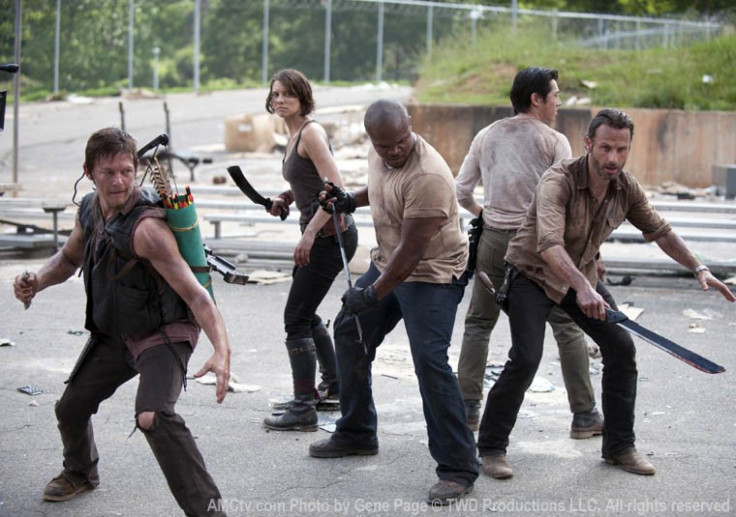'The Walking Dead' Understands Government
Opinion

After a lackluster second season, The Walking Dead has returned with a bang, and it’s added some economics to its arsenal. Over the course of just a few episodes in the third season, the show has managed to depict the economic behavior of governments just about perfectly.
One of the major storylines of the new season revolves around a community of survivors that has emerged as a center of calm in the midst of the apocalyptic madness. Within the confines of the small town of Woodbury, survivors manage to organize enough to live a fairly normal life, complete with food, running water, and other necessities-turned-luxuries by the zombie apocalypse.
But the show’s insight lies in how it depicts the government of this apocalyptic burg.
The survivors have banded together to survive, yes, but like most societies since time immemorial, they want a king to rule over them. Far easier to hire a well-organized group of thugs to control society than to take responsibility for one’s own governance. As Augustine noted in his story of the pirate and Alexander the Great, government is merely a kind of piracy on a large scale. Or as Mancur Olson put it, government emerges when “roving bandits” become “stationary bandits.”
Thus, whether in response to a plea from the community or as a way of inspiring such a plea, a group of rather surly men with guns, led by a man known simply (though tellingly) as “the Governor,” have obligingly taken control of the “defense” of Woodbury. Armed thugs patrol the gates to provide safety, but are they there to prevent the zombies from creeping in, or to keep the citizens from creeping out?
The guards put on smiling faces for the plebs, but their rule is anything but benevolent. In this and other ways, Woodbury serves as a prime example of how governments behave.
All governments are monopolists, and as governments must, the newly formed state sets about eliminating the competition: not the zombies clawing at the gates, but other organized groups of survivors seemingly able to provide services similar to those offered by the community. Competing groups are killed and their resources appropriated for the town.
In one scene, the town’s militia massacres a group of unsuspecting national guardsmen. They happen to carry useful resources, but they also represent an alternative to the system put in place by the Governor. The soldiers are a token of how things used to be, and they must be eliminated, lest anyone start to think too much about how life in town could be different. Back in the small but thriving community, no one is told about the killing of other survivors. The good townspeople want only the (illusory) feeling of security, and don't much care about how they get it, much less about what happens beyond their borders.
The governing thugs further manipulate their own crimes to their advantage, redistributing the supplies looted from their recent prey, further enhancing their image as the saviors of the populace. Claiming that the soldiers were killed in a zombie attack also renews fear amongst the citizens, and most important for the governor, fosters dependence on his system of government.
People should feel safe, but should also be wary of dangers (real or imagined) lurking around every corner, because without the feeling of danger, people quickly start to question the necessity of their rulers.
Even the basic claim of Woodbury’s government, that it provides security, seems to be false. No government would be really complete without some hypocrisy in addition to violence, and it has come to light in a recent episode that the governor is hiding his own zombified daughter, despite the threat she poses to the town.
Ultimately then, the Governor and his henchmen are running an elaborate con game for the citizens. They create a system of rules to keep people in line, and convince people that the rules (which benefit the rulers) are indispensible for the preservation of their society.
As the Governor puts it: “People follow the rules, and whether or not it’s true, they believe it’s what keeps them alive.” Of course, the Governor says he doesn’t wish to invite anarchy (which is what rulers always say), but what he truly fears is inviting any rule other than his own (which is what rulers always mean).
Yet the citizens are not much concerned with what happens behind the scenes; what matters is that they feel their lives are safe and normal. And when tensions seem to be on the rise, the government placates the people with (literally) bread and circuses. The analogies to ancient Rome are obvious, especially given that the town stages actual gladiator battles. The broader symbolism is also clear:
The real zombies are inside the gates, not outside.
This observation has a long history in zombie tales, going back at least to George Romero’s Night of the Living Dead (1968), and it gets a more humorous treatment in Shawn of the Dead (2004). Unfortunately, the similarities between this post-apocalyptic society and governments and citizens of the real world are anything but fictional.
Matt McCaffrey holds a master's degree in economics from Auburn University and is currently a PhD candidate in economics at the University of Angers. He is also the editor of Libertarian Papers.
© Copyright IBTimes 2024. All rights reserved.





















